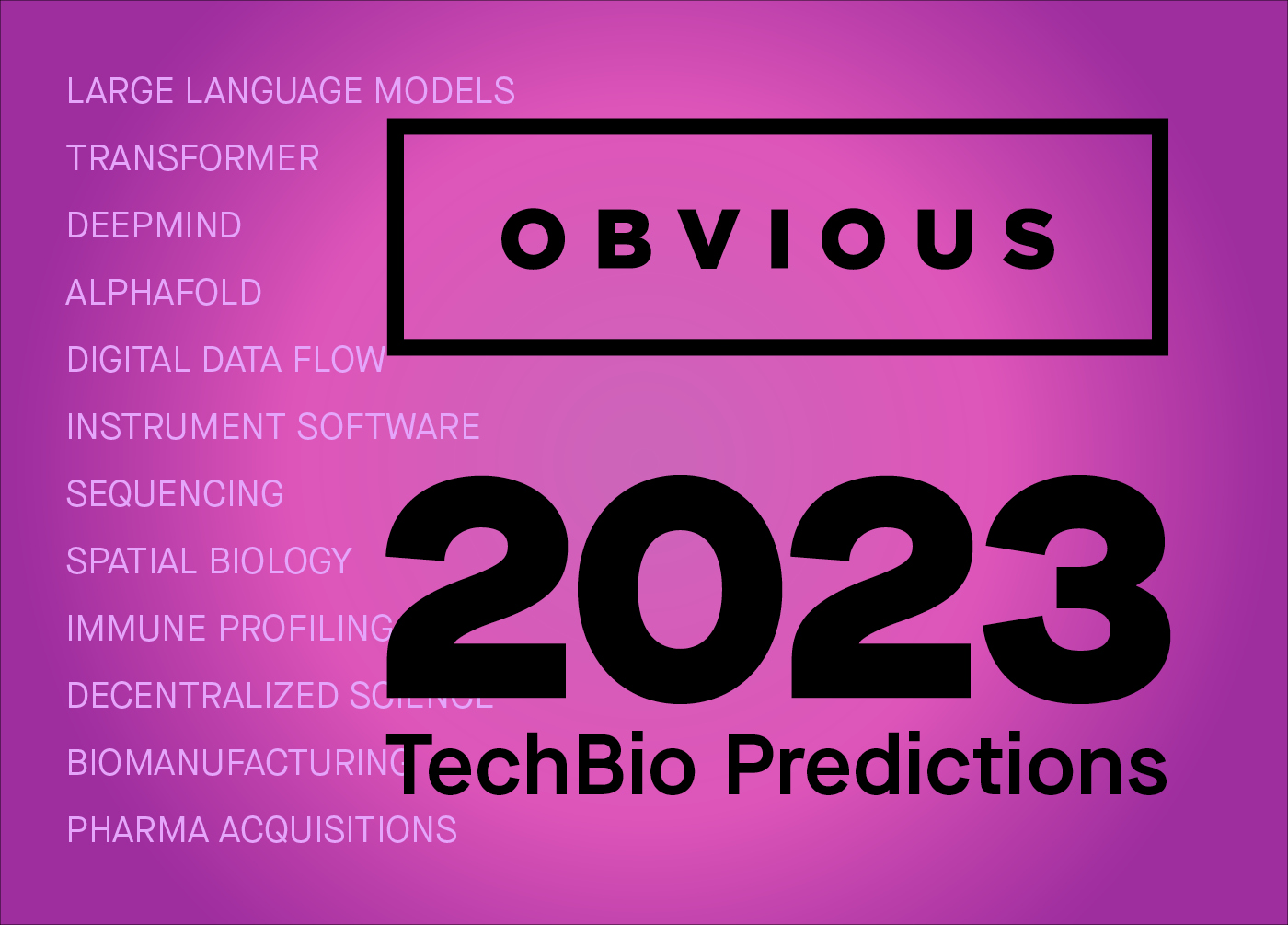10 TechBio Predictions for 2023
We foresee the coming year will be one of convergence in TechBio. Cheaper sequencing and new wet lab tools will enable scaled data generation while recent advances in machine learning will unlock unprecedented analytical and predictive capabilities.
Obvious |

Forecasting is a tricky business. Experts often get it wrong, but it can help form a distinct point of view and strategy. At Obvious, predictions help us understand how trillion-dollar industries might be reimagined in a world positive way.
We foresee the coming year will be one of convergence in TechBio. Cheaper sequencing and new wet lab tools will enable scaled data generation while recent advances in machine learning will unlock unprecedented analytical and predictive capabilities.
Here’s what lookout for in the months ahead:
- Large Language Models: We will continue to marvel at Transformer models and their ability to solve the most complex problems in biology by training on sequence data from DNA, RNA, and protein molecules. Deepmind’s Alphafold was just the start, showcasing the power of these models to predict protein structure from sequence. The next wave of models will go further and begin accurately predicting biological function from sequence.
- Biology OS: As the rapid digitization of the wet lab continues, a longtail of instrument-specific software will become consolidated and comprehensive platforms will emerge as the de facto operating systems for biological research. Lookout for what Benchling is building and Dotmatics is rolling up.
- Digital Data Flow: Digital data flow will be a top priority for leading pharmaceutical enterprises as they look for new ways to reduce costs and increase clinical trial efficiencies. Watch for the new data standard that the industry coalition Transcelerate is putting together.
- Ubiquitous Sequencing: Sequencing costs will plummet as market entrant Ultima Genomics and incumbent Illumina race towards the $100 to $200 price point for whole genome sequencing. Ubiquitous sequencing will do for TechBio what Amazon Web Services did for Software-as-a-Service.
- Spatial Biology: The frontier in spatial biology will keep moving as new techniques surface to analyze samples with increasing resolution and spatial context. Follow the Wyss Institute at Harvard as it continues to spin out cutting-edge spatial technologies through companies such as Vizgen.
- Immune Profiling: Our understanding of the human immune system will rapidly advance as new biological assays paired with advanced machine learning techniques allow us to analyze immune cell types, states and repertoires. Immune profiling companies will simultaneously gain traction in diagnostic and therapeutic end markets. Companies like Adaptive and Microsoft, ImmunAi, and Teiko are innovating in this space.
- Decentralized Science (DeSci): As crypto speculation dies down, more Web3 energy will be refocused on productive applications of the blockchain including DeSci. DeSci DAOs (Decentralized Autonomous Organizations) that work to advance biomedical research will survive the crypto winter and flourish. Molecule, Vibe Bio and LabDao are great examples.
- Biomanufacturing: As government dollars flow in, biomanufacturing will prove to be fertile ground for public-private partnerships. President Biden’s $2B Biotechnology and Biomanufacturing Initiative was just the start. Given the strategic importance and capital intensity of this sector, we may see the development of Biomanufacturing Primes analogous to Defence Primes.
- Series B Crunch: Computationally-driven drug discovery companies will face a tougher funding environment, especially in the Series B and beyond. As biotech venture funding slows down, investors will assign more value to pipelines over platforms. The best companies, however—with differentiated, advantaged platforms and rational plans for value creation including early and extensive partnership activity—will not only weather the storm, but emerge stronger on the other side.
- Deal Making: Top 20 pharma CEOs will start acquiring SMID cap biotechs at a rapid rate. Big pharma will leverage the $300 billion dollars on its balance sheet to target SMID cap biotechs with interesting pipelines at attractive valuations. Deals could be announced as early as January at the JP Morgan Health Care Conference.
If you’re equally as excited about what 2023 has in store for TechBio, we’d love to hear from you: rohan@obviousventures.com, kahini@obviousventures.com, and vishal@obviousventures.com.



